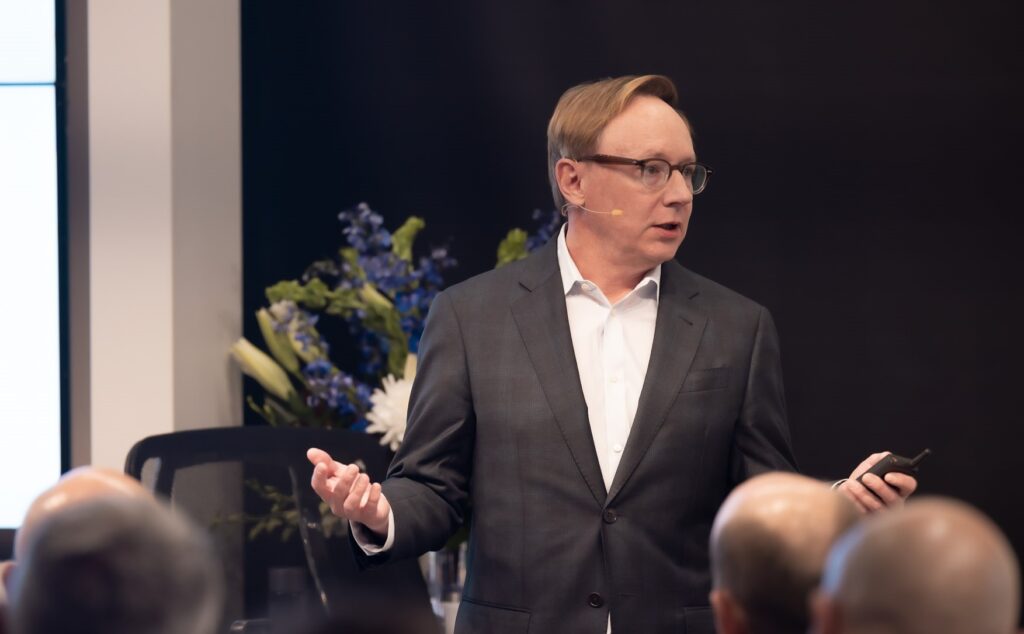
Each day, 10,000 Baby Boomers will reach the age of retirement from now until 2030.1 For entrepreneurs, this can create an eminent threat to the future or their business. For financial advisors, this can cause uncertainty for their investors and their financial future.
Research suggests that only 35 percent of organizations have a formalized succession plan.1 This can leave a majority of businesses without a clear path forward if their current leadership is not in place.
Succession planning is imperative to the future of your organization, says David DeVoe, Founder and CEO of DeVoe & Company, a consulting firm founded in 2011 that provides succession planning and valuation for wealth management firms.
“You have people’s life savings,” DeVoe said while speaking at Matson Money’s Advanced Advisor Conference in March 2023. “If they aren’t saying it out loud, what they are asking often is ‘what happens to me and my money, if something happens to you?’”
Why don’t more business owners have a succession plan? Is it a psychological slippery slope of addressing the thought of retirement or even death? Is the complexity of a succession plan too intimidating?
“Succession planning is critical; it’s not just the financial part of getting your organization valued,” said Mark Matson, Founder and CEO of Matson Money. “It’s who do you trust? Who’s going to manage your business? Who’s going to take care of what you built?”
The State of Succession Planning
While only about one-third of companies have a succession plan in place, 64% of respondents in a survey conducted by DeVoe & Company recognized that the lack of succession planning is a big future problem for the industry, said DeVoe.2
Firms are becoming more valuable which is cause for concern for some advisors, he said. According to research from DeVoe & Company, in 2022, only 29 percent of respondents were confident the next generation could afford to buy out their business.2
“There’s a point where the mail truck is going too fast, and the dog can’t catch it,” said DeVoe.
Of those who are cognizant of the need for a succession plan, some do not know – or have not sought out – where to begin.
The Building Blocks of Succession Planning
Start with goals and objectives, says DeVoe. What do you seek to achieve both professionally and personally? Consider retirement as well; what does it look like? And finally, what do you want to contribute economically?
“Once you have these equations and have taken the time and energy to think through your business, personal, and economic goals, you have a north star in place and are in a position to think through your succession plan,” said DeVoe. “This is really a fulcrum for any strategic thinking you can and should do for your organization.”
Entrepreneurs have many options when succession planning: internal succession, selling the company externally, acquiring a successor, etc. When considering who is qualified to take over your company, DeVoe suggests evaluating their technical capabilities, management skills, leadership qualities, and their practical ability to acquire the business.
“What you don’t want is a mini-me,” says DeVoe. “You are an entrepreneur. You had to have the guts to do this, to engage and lean in, to eat top ramen, to make it work, and to build your business into what it is today. But what you need is a successor who is going to take your business to the next level, not someone who is a clone of you.”
Valuing Your Firm
Through the valuation process, entrepreneurs can discover what is, and is not, working in their business. Valuation can create a diagnostic of your firm and can be instrumental in planning for the future of the organization.3
“There are literally a myriad of different things that go into valuation,” said DeVoe, whose company utilizes a 30,000 proprietary discounted cash flow model for valuations. “But all of them fall into three different categories: growth of the organization, the profitability of the organization, and the risks associated with the transition.”
DeVoe also suggests assessing the client lifecycle from prospecting to assessing, positioning, closing, and retaining clients. This is critical to having a strong growth machine, says DeVoe.
“The weakest link in the lifecycle of a client is where your business will fail,” he said. “You need to close these gaps as quickly as you can. Your ability to do this is a great lens to look through to optimize your business. You’re not growing out of charisma, you’re growing because you developed a machine that is going to grow sustainably.”
That machine should be engineered to outlast any individual within the organization. With a carefully designed succession plan in place, this can be possible. Investors can have confidence in a financial advisor who puts their needs front and center – including taking the time to create a carefully constructed succession plan.
“You’re going to lose everybody between now and age 100; either your age 100 or theirs,” said Matson. “This is inevitable. The statistics on death are impressive.”
At Matson Money, we are training and developing investors to be prudent and disciplined throughout an entire lifetime, and to have confidence in their long-term investing strategy. Read more about how we have reimagined investing.
1. Robinson, Shauna. Succession Planning: Is Your Organization Prepared? Association for Talen Development. 18 January 2019. Retrieved from https://www.td.org/insights/succession-planning-is-your-organization-prepared.
2. Annual RIA M&A Outlook. Advisors Expect Deceleration After Yars of Rising Activity. DeVoe & Company. December 2022. Retrieved from https://static1.squarespace.com/static/5410ec1be4b0b9bdbd0cc342/t/6397617d11c40e09e53af09c/1670865278874/DeVoe+2022+RIA+M%26A+Outlook+Study.pdf
3. Your DeVoe & Company Valuation: More Than Just a Number. DeVoe & Company. Retrieved from https://www.devoeandcompany.com/valuation.
DISCLOSURES:
This content is not to be considered investment advice and is not to be relied upon as the basis for entering into any transaction or advisory relationship or making any investment decision.
This content includes the opinions, beliefs, or viewpoints of Matson Money. All of Matson Money’s advisory services are marketed almost exclusively by either Solicitors or Co-Advisors. Both Co-Advisors and Solicitors are independent contractors, not employees or agents of Matson.
Other financial organizations may analyze investments and take a different approach to investing than that of Matson Money. All investing involves risks and costs. No investment strategy (including asset allocation and diversification strategies) can ensure peace of mind, guarantee profit, or protect against loss.
PAST PERFORMANCE IS NO GUARANTEE OF FUTURE RESULTS
David DeVoe and DeVoe & Company are not affiliated with Matson Money, Inc. Nothing included herein is intended to imply or construe partnership or indicate endorsement.




